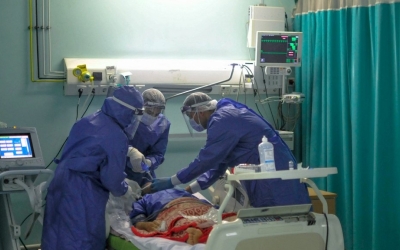A blow to the poor: Egypt's public hospitals up for privatisation after new law

A new law giving the private sector the right to operate public hospitals has raised concerns among Egypt's population, more than half of whom rely on government-run health facilities.
Approved by parliament on 20 May, the Law on the Management and the Operation of Medical Establishments will come into effect after it's ratified by President Abdel Fattah el-Sisi.
The government hopes the law, the first in the country’s history, will attract investment in the health sector and improve medical services offered by the public hospitals.
Nevertheless, the legislation has prompted widespread opposition, including from the Doctors Syndicate, the independent guild of physicians, which has called on the president not to ratify it.
Stay informed with MEE's newsletters
Sign up to get the latest alerts, insights and analysis, starting with Turkey Unpacked
The syndicate expressed fear that the law would not commit the private sector to treating low-income patients for free, as the government does now.
"It does not include binding measures for the private sector to offer medical services to the poor at affordable prices," Dr Ibrahim al-Zayat, a syndicate board member, told Middle East Eye.
"The government has proven failure in running the public hospitals, but the poor cannot be asked to pay for this," he added.
'It does not include binding measures for the private sector to offer medical services to the poor at affordable prices'
– Dr Ibrahim al-Zayat
Civil society has also weighed in, accusing the government of commercialising medical services.
The Egyptian Initiative for Personal Rights has denounced the law as flawed, and said it was rushed through without enough discussion by lawmakers.
"The new law will allow a number of government hospitals to be taken out of the insurance system, which will hinder its implementation and entail a deviation from the path of comprehensive coverage for all citizens," the group said in a statement.
"The law disrupts the implementation of the Comprehensive Health Insurance Law, and constitutes a deviation from the path of gradual expansion in its application," it said, referring to a 2018 plan by the government of President Sisi to phase out comprehensive health insurance.
The government has, however, assured the public that a private sector administration of the government-owned hospitals would not cause the prices of medical services at these hospitals to rise as feared.
"The government pays for the treatment of the poor," said Minister of Health Hossam Abdel Ghaffar.
"It will continue to do so, even after the enforcement of the new law," he told a local television channel on Tuesday.
Around 50 percent of Egypt's population of 105 million is registered in the country's decades-old health insurance system.
Those not registered in the system, including private sector and irregular workers, can get free medical treatment within the national free medical treatment system, which is funded by the government.
Overwhelmed and understaffed
Egypt has rising debt and an ailing economy. Unable to cope with the health needs of the growing population, Abdel Ghaffar said his government needs the private sector to step in to support state efforts.
In the past 10 years, Egypt's population has grown by 25 million.
Most of Egypt's public hospitals are operated by the Ministry of Health. There are also hundreds of privately owned hospitals, where the cost of treatment is beyond the reach of most people, in a country where almost a third of the population live in poverty.
The constitution commits the government to specifying three percent of Egypt's gross domestic product to health spending.
Nonetheless, as in previous years, the government has this year allocated less than half of the amount specified in the constitution to spending on the health sector.
Overwhelmed, understaffed and suffering catastrophic deterioration, Egypt's public hospitals are a mere shadow of their former selves, when the country was the region's medical leader, especially during the 1950s and 1960s.
Yet public hospitals remain a last refuge for millions of poor Egyptians who cannot pay for their medical treatment, said Mohamed Fouad, head of the local rights group Society for Right to Medicine and Healthcare.
"They offer free treatment to millions of people every year," he told MEE.
The government paid for surgery for around 2.9 million financially incapable Egyptians in 2021, mostly in the 662 hospitals operated by the Ministry of Health, according to CAPMAS, the government's statistics arm.
Mona Salah is a widowed mother of four who underwent angioplasty and stent placement in a public hospital. Depending on social support from the state, Salah would never have been able to pay for this care. In a private hospital, it could have cost as much as $1,000, an astronomical amount of money for people like her.
"I underwent the operation and paid nothing," Salah, 50, told MEE.
"I could have faced death but for the free treatment I received, given the high cost of the same operation in private hospitals," she said.
Middle East Eye delivers independent and unrivalled coverage and analysis of the Middle East, North Africa and beyond. To learn more about republishing this content and the associated fees, please fill out this form. More about MEE can be found here.





